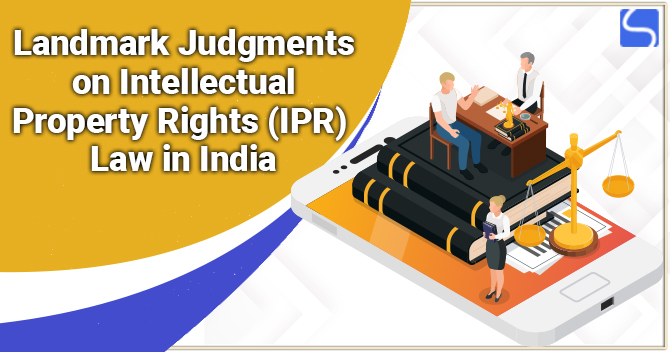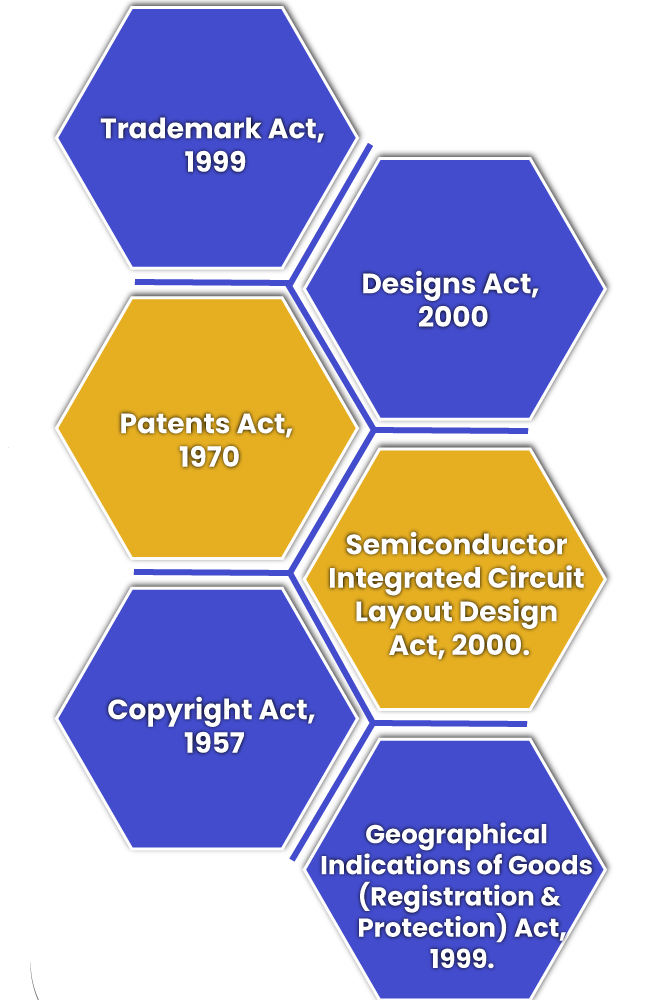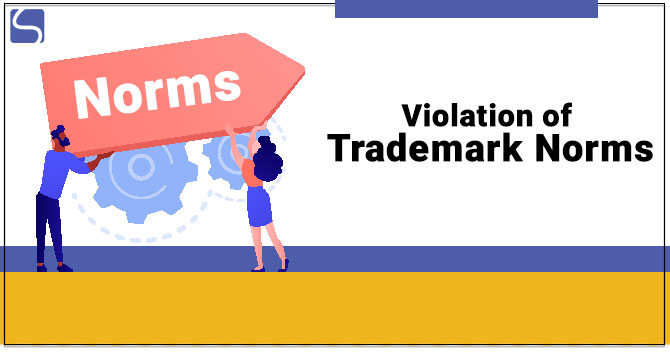Landmark Judgments on Intellectual Property Rights (IPR) Law in India

Japsanjam Kaur Wadhera | Updated: Feb 05, 2021 | Category: Trademark
Intellectual property rights (IPR) are the rights which are given to the person over the invention and creation of something which is original. The creator is given an exclusive right over the use of his or her creation for a specified period of time. Intellectual property right is in itself a very broad term. It is the outcome of human intellect which includes creativity, invention, trademarks, songs, brand etc. It protects the rights of the creator of the original work and provides many legal rights as well. This article will talk about the landmark judgments on IPR law in India.
Table of Contents
What is Intellectual Property Rights (IPR)?
The term intellectual property is related to the human intellect applied for creativity and invention. Efforts in terms of manpower, energy, time, money, skill and etc are required to create or invent something new and original. Such creation and invention that takes place is clearly an intangible property of the person who created or invented it. And thus, it also needs to be protected in some or the other way. Legal rights are provided to the creator or innovator to get the economic benefits on such creation and invention. Therefore, Intellectual Property Rights are the exclusive territorial rights which are provided to the owner of the original work, by which the owner can sell, license, assign, buy his intellectual property similar to that like physical property.
The registration of IPR at the legal authorities is important in some tangible or presentable form to claim all the benefits upon registration. Each type of IPR provides special rights to the creator or inventor to get the economic rights and benefits which further motivates skill and creativity and development of the society.
Also, Read: Know how Indian Trademark Registration Will Boost Your Business
Classification of Intellectual Property Rights (IPR)
Depending on the basis of creation or invention of the original work, the Intellectual Property Rights are classified as follows:

Trademark Act, 1999
A trademark is a distinctive, sign, word, logo, design, symbol, letters and numerals etc that denotes about a particular product or services produced by an individual or industry or enterprise. Trademark is important for every business so as to distinguish its products or services from those of the others in the market. Trademark registration is important to protect the trademark of a brand from being infringed or misused by others. The Trademarks Act, 1999 provides the rules and procedures which are required to be followed in order to register a certain trademark and get all the legal rights and benefits that can be enjoyed by the owner of the trademark upon the registration.
Trademark helps the companies to make their own reputation, recognition and trust amongst the customers. In many cases, the customers rely on the trademarks when it is difficult to inspect the quality of the product or service.
The Indian Trademarks Act states that any mark which is distinctive, that is, a mark which is capable of distinguishing goods and services of one undertaking from another and is capable of being represented geographically can be a trademark.
The initial trademark registration in India is for 10 years and thereafter it is required to be renewed from time to time. The applicant can apply for trademark registration with the Registrar of Trademarks Office.
Patents Act, 1970
A patent is an intellectual property right granted to the inventor to use and commercially exploit his/ her invention. This exclusive right is granted by the concerned government office for his novel technical invention. The Patent Act, 1970 lays down all the necessary provision related to the grant, ownership, exploitation, revocation, term etc of patents.
The term invention means any solution to a problem in terms of development of a process or a product. Patents are considered the most valuable among the different types of IPR.
In order to patent any invention, the following criterion is required to be fulfilled: –
- Usefulness: The invention must be applied for practical purpose or must have industrial applicability.
- Non-Obviousness:Any invention done by any an ordinary skilled person is obvious and cannot be patentable under the Patents Act. Therefore, it is necessary that the invention must not be obvious for patentability.
- Novelty: An invention must be a new technology which has not been published earlier or available in prior art of the country or anywhere in the world before the date of fling a patent.
The term of patent in India is 20 years from the date of filing the patent application.
Copyright Act, 1957
Copyright protect the ideas of authors, creators and artists of an original work. That is, the Copyright Act, 1957 covers the creative aspects of intellectual property. The development of the society and country depends upon the creativity of the people. Copyright law encourages such type of activities. Copyright law protects the expression of idea of author but not the idea as such. It protects the rights of the creator of the original work by prohibiting the use of such work by any other person without the consent of the copyright holder. Copyright laws cover literary and scientific works, musical, artistic, computer programmes, photographic, cinematograph, dramatic, sound recordings, architectural works.
The term for protection of copyright registration in India is for 60 years for literary, musical, dramatic and artistic works after the death of the creator. And in cases of sound recording and film term is 60 years from the beginning of calendar year next following year in which it is published or released. Besides these, the author gets the moral, economic and statutory rights under the Copyright Act.
Designs Act, 2000
The creative activity of achieving an ornamental or aesthetic appearance of mass products produced or articles is covered under the industrial designs. The Designs Act, 2000 was implemented to bring growth and development in industrial designs. If protects and safeguards the artistic aspect that is, the designs of industrial products. The design can be expressed as either two dimensional or three dimensional forms.
Designs refer to shape, pattern, configuration, ornament, lines, colour, and surface etc appearance related features of industrial products. The duration of protection of industrial design is for 10 years in India and can be extended further for 5 years.
Besides these, some other intellectual property laws enforced in India includes:
- Semiconductor Integrated Circuit Layout Design Act, 2000.
- Geographical Indications of Goods (Registration & Protection) Act, 1999.
What are the Landmark Judgments on IPR Law?
With the implementation of these legislations, there have been number of disputes in intellectual property rights law that came before the courts. Over the years, the courts have been adjudicating countless intellectual property rights disputes as people are now much aware of the legal rights they possess in case of any infringement occurs for their protected work and seek legal relief for such damages and compensation against such infringement. Some of the landmark judgments on IPR law in India are as follows: –
Bajaj Auto vs. TVS Motor Company Limited JT 2009 (12) SC 103
The Apex Court, by this landmark judgment directed all the courts in India for speedy trial and disposal of the intellectual property related cases. In this present case, a patent dispute subsisted for over two years between two companies involved in a dispute for using twin spark plug engine technology.
Noticing the pendency of appeals related to the intellectual property rights cases in Indian Courts, J. Maekandey Katju and J. Ashok Kumar Ganguly directed all the Indian Courts for speedy trial and disposal of suits relating to matters of trademarks, patent and copyrights. The Apex court directed that the judgments must be given within four months from the date of the institution of such suits and further stated that all the courts and tribunals in the country must carry out the aforesaid orders faithfully and punctually.
Bayer Corporation vs. Union of India 162(2009) DLT 371
In this present case, Bayer Corporation attempted to link the case of patent infringement to granting marketing approval of a drug made by Cipla. It filed an inventive writ petition in Hon’ble High Court of Delhi that since the applications of Cipla “SORANIB” infringed its patent, its marketing approval application under the Drugs act should be entertained or processed. This was the first time that an attempt to link drug approval to patent infringement was made in India.
The Hon’ble High Court of Delhi stated that there is not Drug Patent Linkage mechanism in India and the determination of patent standards can only be done by the Controller of patent having the authority.
It was held that mere market approval of drug does not result in patent infringement and the jurisdiction of it does not lie with the Drug authorities.
Novartis vs. Union of India (Civil Appeal No. 2706-2716 of 2013 arising out of SLP (C) NO. 20539- 20549 of 2009)
In this present case, an application was filed by Novartis to patent one of its drugs called “Gleevec” by covering it under Section 3 of Patents Act, 1970 as invention. The application was rejected by Apex Court on the grounds that Novartis failed to meet the requirement of novelty. That there was no invention of a new drug, as the mere discovery of an already existing drug is not an invention. Also, thereby failing to qualify test of invention as given under section 2(1) (j) and 2(1_ (ja) of the Patents Act as a result of various disclosures and publications already made about the “Beta Crystalline” form of compound used in the drug, Imatinib Mesylate. Further the Apex Court interpreted efficacy as laid down in section 3(d) of the Act on lines of therapeutic efficacy and not merely physical efficacy and Novartis failed to meet the requirements under section 3(d) of the Act.
The Supreme Court preferred the therapeutic efficacy interpretation over physical efficacy on the fact that the compound was of medical value.
Coca- Cola Company vs. Bisleri International Pvt. Ltd Manu/ De/ 2698/ 2009
In this present case, the Hon’ble High Court of Delhi held that if threat of infringement exists, then this court would have the jurisdiction. And stated that exporting of goods from a country shall be considered as sale within the country from where export of goods has been taken place and the same would amount to infringement of Trademark.
The defendant Bisleri Ltd. had sell the trademark MAAZA including its know- how, Intellectual property rights, formulation rights and goodwill through a master agreement. It applied for registration of TM MAAZA in Turkey and imported fruit drinks under the same name. The Court held that the intention of using the trademark besides indirect or direct use of the trademark was enough and sufficient to give jurisdiction to the court to decide this issue. The Hon’ble High Court granted an interim injunction against the defendant (Bisleri).
Yahoo!, Inc. vs. Akash Arora & Anr. 78 (1999) DLT 285
In this present case, the plaintiff was the owner of the Trademark “Yahoo!” and domain name “Yahoo.Com”. The defendant used the name “Yahoo India” for similar services and was thereby opposed by the plaintiff.
The Hon’ble High Court of Delhi held that the principle underlying the action for passing off is that no person is entitled to carry out the business in such a manner as it would lead to belief that such person is carrying on the business of another person or to believe that he is carrying on or has any connection with the business of another person. The Court Reiterated “when a business is done by a defendant under a name which is quite close to the name under which a plaintiff is trading and such name has acquired a reputation and public at large is likely to mislead that the business of defendant is the plaintiff’s business, or is a department or branch of the plaintiff, the defendant is liable for an action of passing off” therefore, Injunction was granted in favour of plaintiff.
Patel Field Marshal Agencies Ltd. vs. PM Diesels Ltd 2018 (2) SCC 112
THE Apex Court in this landmark judgment settled a significant issue that when a suit is instituted for infringement under Trademarks Act, the remedies for rectification of trademark under section 47 and 57 are still available to the litigant in cases the where the litigant has abandoned the plea of validity. The Apex Court Considered the conflicting decisions of the various courts and found that where the court has not take up the question of validity, the power is given to the statutory authority to decide a rectification claim by the litigant. However, in cases where the court comes to a prima facie conclusion on the validity, the only remedy that is available and can be seek is an appeal.
Conclusion
The Intellectual property rights protect the creator’s interest in the work which is created by him and is original. The creator has the legal rights to sue any person who causes infringement to his original work. There are number of cases that are being dealt by the court on the matters related to intellectual property rights, some of which has been discussed above. Through these landmark judgments on IPR law in India, the courts have ensured the faith of the people in the judicial system.
Also, Read: What is the Procedure and Cost Involved in the Trademark Registration?














